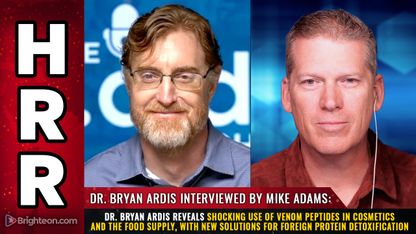
Advertisement
The FDA’s decision to ban triclosan, triclocarban and 17 other common chemicals used to create antibacterial soaps proves what many of us already knew: These products are a scam. The Food and Drug Administration has stated that antibacterial soaps offer no advantage over traditional soaps, and some of the ingredients found in them are pretty unsavory.
There is evidence indicating that chemicals such as triclosan and triclocarban, among others, can cause unwanted side effects. They have been linked to hormonal disruption and muscle weakness. ABC News reported in 2012 that researchers from the University of California at Davis studied the effects triclosan had on muscle fibers in mice, and what they found was horrifying. When the mice were exposed to triclosan, they found it actually impaired the fibers’ contraction mechanisms. Both cardiac muscle and skeletal muscle tissues were affected. Heart function in the mice was reduced by up to 25 percent within 20 minutes after exposure to triclosan. The mice also experienced a reduction in their grip strength by almost 20 percent for up to an hour after exposure.
The toxicity of triclosan and other similar chemicals simply cannot be ignored – even if their potential dangers have only been outlined in animal studies. In a 2012 interview, Dr. Philip J. Landrigan, dean of global health in the department of preventive medicine at the Mount Sinai School of Medicine in New York City, told ABC News: “Many synthetic chemicals now known to be toxic to humans were first recognized as toxic in animal studies.”
Of course, instead of just removing the toxic triclosan and other such chemicals from their soaps and moving on to more natural products, many soap manufacturers have come up with new chemicals to replace the old ones! NPR notes that many antibacterial soap products have simply exchanged triclosan for one of three other chemical agents: benzalkonium chloride, benzethonium chloride or chloroxylenol (PCMX). And naturally, the FDA has given these people another whole year to draw up some data that indicates their efficacy and safety. Shouldn’t that kind of thing be done before exposing people to new chemical agents? Probably, but who can resist free test subjects?
If you’re concerned about what’s really in your soap – as you rightfully should be – you might be interested in organic, all-natural soaps. Natural, organic soaps are known to be gentler on your skin and have actual, nourishing ingredients in them that help keep skin healthy and glowing. There are a variety of all-natural soaps to choose from, with different scents to boost energy or encourage relaxation. It’s important to buy a product you know you can trust, like one of the many choices available through the Health Ranger’s line of organic soaps.
Sources:
Submit a correction >>
This article may contain statements that reflect the opinion of the author
Advertisement
Advertisements















